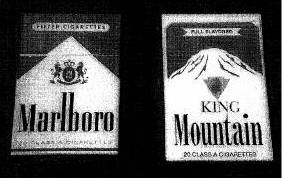
On Jan. 20 the Ninth Circuit considered whether colorable tribal court jurisdiction existed over a nonmember’s federal trademark claims against tribal defendants for alleged passing off of cigarettes on the Internet, on the reservation of another tribe, and elsewhere.
Philip Morris USA, Inc., brought suit against King Mountain Tobacco Co., Inc., in the Eastern District of Washington. Philip Morris’ packaging bears a distinctive “red roof” design, featuring two red triangles filling the top corners of its otherwise white package such that there is a white peak with red above it. King Mountain’s cigarette packages feature an image of a snowcovered mountain against a red backdrop.
Philip Morris alleged likelihood of confusion with aspects of its package design and likelihood of dilution. King Mountain argued that its packaging depicts Mt. Adams — known as “Pahto” in the Yakima Nation — a mountain of spiritual and cultural significance to the Yakima Tribe and that any resemblance to Philip Morris’ packaging is inadvertent and incidental.
In response to Philip Morris’ effort to enjoin King Mountain’s continued use of its packaging, King Mountain argued that Philip Morris had failed to exhaust tribal remedies, and that it had not shown a likelihood of success on the merits of its Lanham Act claims. Eastern District Judge Robert Whaley denied Philip Morris’ requested injunctions and granted King Mountain’s motion to stay the federal case to allow the Tribal Court to address its own jurisdiction.
Philip Morris appealed. Applying principles of tribal jurisdiction, the Ninth Circuit found that the Yakima Tribal Court did not have colorable jurisdiction over King Mountain’s tribal action for declaratory relief insofar as it implicates Philip Morris’ federal trademark infringement claim against King Mountain and its principals, members of the Yakima Tribe. Thus, exhaustion of tribal remedies would serve no purpose other than delay.
The Ninth Circuit reasoned: “[S]urely the district court is not suggesting that the tribe would have regulatory authority over federal trademark registration. Significantly, Philip Morris holds federal trademarks and trade dress registered under the Lanham Act, trademarks whose validity King Mountain apparently challenges.”
Framed this way, the Ninth Circuit reversed and remanded the Eastern District’s order, finding the issue was one properly decided in federal court applying federal law.
The case cite is Philip Morris USA, Inc. v. King Mountain Tobacco Co., Inc., No. 06-36066, __ F.3d. __, 2009 WL 115589 (9th Cir.).